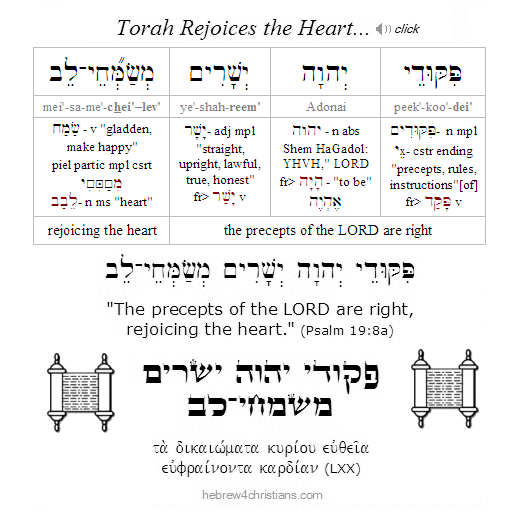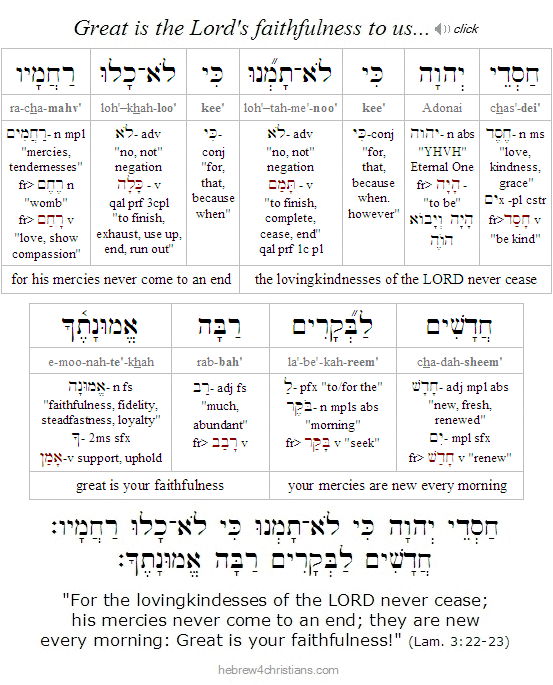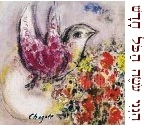|
During Tishah B'Av we restrict our study of Torah to the grave matter of God's judgment for our sins. We read the prophet Jeremiah and grieve over the destruction of the Temple. We weep over the lost vision of Zion - and of the exile of the Jewish people. This is a somber time of national mourning for Israel...
But there is always hope, even in our darkest hour.... The Sabbath immediately following Tishah B'Av is called Shabbat Nachamu (שבת נחמו ), "the Sabbath of Comfort," because we take time to remember Israel's prophetic future. The Haftarah therefore begins: Nachamu, nachamu ammi (נַחֲמוּ נַחֲמוּ עַמִּי) "Comfort, comfort, my people, says your God" (Isa. 40:1). And because the study of Torah brings comfort and joy to our hearts, the sages chose parashat Vaetchanan to be read at this time to emphasize our duty to learn Torah (תַּלְמוּד תּוֹרָה) and to rejoice in the revelation of God:
פִּקּוּדֵי יהוה יְשָׁרִים מְשַׂמְּחֵי־לֵב
מִצְוַת יְהוָה בָּרָה מְאִירַת עֵינָיִם
pee·koo·dei · Adonai · ye·shah·reem · mei·sa·me·chei · lev
meetz·vat · Adonai · bah·rah · me·ee·rat · eiy·nah·yeem

"The precepts of the LORD are right, rejoicing the heart;
The commandment of LORD is pure, bringing light (אוֹר) to the eyes."
(Psalm 19:8)
 |
The Torah portion begins with Moses' plea to the LORD to be allowed entry into the Promised Land, despite God's earlier decree (Num. 20:8-12; 27:12-14). The Hebrew word va'etchanan (וָאֶתְחַנַּן) comes from the verb chanan (חָנַן), which means to beseech or implore. It derives from the noun chen (חֵן), grace, implying that the supplication appeal's to God's favor, not to any idea of personal merit (in Jewish tradition, tachanun (תַּחֲנוּן) are prayers recited after the Amidah begging for God's grace and mercy). Moses was asking God to show him grace by reversing the decree that forbade him to enter the Promised Land.
Note that in Jewish tradition, the idea of appealing to God's grace is not without expending personal effort. The gematria of vaetchanan is 515 -- the same as the word for prayer (i.e., tefillah, תְּפִלָּה) -- which suggests (according to some of the sages) that Moses offered tachanunim (supplications) no less than 515 times to be allowed into the Promised Land. Despite his repeated appeals, however, God finally said to Moses: רַב־לָך, "enough from you" (Deut. 3:26) and reaffirmed His decree that he would not be allowed to lead Israel into the land. That privilege was given to Yehoshua bin Nun (יְהוֹשֻׁעַ בִּן־נוּן), i.e., "Joshua the son of Nun," who was clearly a picture of the Messiah.
Moses was forbidden into the land because symbolically the covenant made at Sinai was insufficient to fulfill the promise of God. This insufficiency, however, was not the fault of God's Torah, which is "holy, just, and good" (Rom. 7:12), but rather because of the weakness of the human condition (i.e., the law of sin and death). "For God has done what the law, weakened by the flesh, could not do. By sending his own Son in the likeness of sinful flesh and for sin, he condemned sin in the flesh, in order that the righteous requirement of the law might be fulfilled in us, who walk not according to the flesh but according to the Spirit" (Rom. 8:3-4). The New Covenant was needed to bring people to Zion, and this required a "change in the Torah" and a new priesthood (Heb. 7:12). "The former commandment was set aside because of its weakness and uselessness - for the law made nothing perfect - but a better hope is introduced, and that is how we draw near to God" (Heb. 7:18-19).
The sages refer to the principle: ma'aseh avot siman labanim (מַעֲשֵׂה אֲבוֹת סִימָן לַבָּנִים): "The deeds of the fathers are signs for the children." The entire Exodus story amounted to a sort of parable: "As below, so above" (and conversely). In Jewish midrash, the rock is called the "well of Miriam" because the water was said to have run dry upon her death. But this is simply a midrash, and we know from the New Testament that both the manna (i.e., lechem ha-chayim: לֶחֶם הַחַיִּים) and the living water (i.e., mayim ha-chayim: מַיִם הַחַיִּים) both represented the Presence of Yeshua (John 6:35; 7:38). "Our fathers ... passed through the sea and ate the same spiritual food and drank the same spiritual drink. For they drank from the spiritual Rock that followed them, and the Rock was the Messiah" (1 Cor. 10:1-4). This Rock was not given to Israel in the merit of Miriam, but rather foreshadowed the sustenance of life given through the One who would be stricken for His people (Isa. 53:4 and 1 Cor. 10:4). The Torah states that Moses' sin that led to his exile was that he "struck the rock twice" (Chukat), and this implied that the Savior of Israel would need to be stricken a second time to give life the people. No! The Rock that was once smitten for the people was now to be spoken to as the "Living Rock" (Num. 20:8, 1 Cor. 10:4).

Even in the face of exile, we know that God's correction and judgment is not the last word for those who turn to Him in trust (Lam. 3:22-23). In the end, the Jewish people will be saved (Rom. 11:26), just as Moses was indeed later admitted to the Promised Land where he met with Yeshua on the Mount of Transfiguration (Matt. 17:1-5). The LORD is faithful and true, and He will never break His promise to the children of Israel...
חַסְדֵי יְהוָה כִּי לא־תָמְנוּ
כִּי לא־כָלוּ רַחֲמָיו
חֲדָשִׁים לַבְּקָרִים רַבָּה אֱמוּנָתֶךָ
chas·dei · Adonai · kee · lo - ta·me·noo
kee · lo - khah·loo · ra·cha·mav
cha·da·sheem · la·be·ka·reem · rab·bah · e·moo·na·te'·kha

"The lovingkindnesses of the LORD never cease;
his mercies never come to an end;
they are new every morning: great is your faithfulness."
(Lam. 3:22-23)

Hebrew Study Card

|






